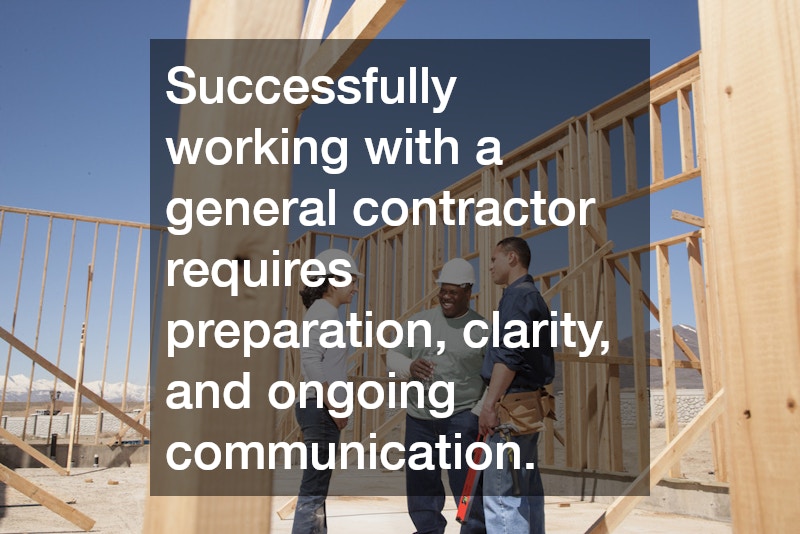Working with a general contractor can feel overwhelming, especially if you’re tackling your first home renovation or construction project. From selecting the right professional to managing timelines and budgets, there are many moving parts that require attention. Partnering effectively with a general contractor can make all the difference in whether your project ends with satisfaction or stress. The five tips below will help you navigate the process, avoid common pitfalls, and set your project up for success.
1. How to Choose the Right General Contractor
Before signing any agreements, it’s important to understand exactly what your project needs. A kitchen remodel, room addition, or whole-home renovation all come with different scopes of work and require different skill sets. Choosing a general contractor with the right experience ensures that the work will meet your expectations. Start by researching local professionals with a strong reputation. Online reviews, portfolios of past projects, and word-of-mouth recommendations can provide valuable insights. Once you narrow your list, compare multiple contractors to evaluate their workmanship, responsiveness, and pricing. Credentials are just as important as reviews. Always verify that the contractor is licensed and insured. Ask for references from recent clients, and follow up with them to get a sense of the contractor’s professionalism, punctuality, and ability to stay within budget. Doing this due diligence up front helps prevent larger issues later on.
2. What to Include in Your Contract with a General Contractor
Once you’ve selected a general contractor, a detailed contract is your best protection. Start by outlining the full scope of work. Be specific about what is being done, the materials to be used, and who is responsible for sourcing them. Vague language can lead to misunderstandings that derail the project. Define your payment terms clearly. Many contractors work on a milestone-based schedule, where payments are tied to phases of the project (e.g., demolition complete, framing done, final walkthrough). Avoid paying too much upfront, and always ensure that payment reflects work completed. Set a realistic timeline with key milestones and completion dates. While construction timelines can shift, having a clear schedule helps both parties stay accountable. This portion of the contract should also include penalties or remedies in case of significant delays without valid cause.
3. How to Communicate Effectively with Your General Contractor
Clear communication is essential to keep your project running smoothly. From the outset, establish preferred communication methods—whether that’s emails, phone calls, or weekly in-person meetings. Documenting conversations in writing can also help clarify expectations and decisions. Regular progress updates are key. Don’t hesitate to schedule recurring check-ins to stay up to date on timelines, changes, and any issues that arise. These touchpoints can prevent small concerns from snowballing into bigger problems. Disputes are sometimes unavoidable. Whether it’s a disagreement over materials or a scheduling issue, it’s helpful to have a conflict-resolution plan in place. Make sure your contract outlines how disputes will be handled—whether through mediation, arbitration, or another method. A general contractor with good communication skills will help resolve most issues before they escalate.
4. What to Expect During the Project Timeline
Understanding the phases of your project helps you manage expectations. Most construction projects follow a sequence that includes planning, demolition, framing, mechanical installations, finishes, and final inspection. A knowledgeable general contractor will walk you through these steps and give you realistic expectations for each phase. Despite the best planning, delays can happen. Weather, permit approvals, and unexpected structural issues can all slow things down. Discuss potential delays with your contractor in advance and ask how they handle scheduling setbacks. Proactive contractors will build buffer time into the schedule. If you decide to make changes mid-project—such as upgrading materials or expanding the project scope—make sure these adjustments are documented and priced accordingly. Even minor changes can affect your timeline and budget, so transparency is essential.
5. Understanding Costs and Budgeting
Start your project with a well-thought-out budget. Work with your general contractor to estimate total costs, including materials, labor, permits, and any subcontracted services. Be sure to include a contingency fund—typically 10-20%—for unexpected expenses. Track all expenses throughout the project. Save receipts, monitor invoices, and request regular cost updates from your contractor. Staying organized helps prevent budget overruns and gives you a clear view of where your money is going. Cost overruns can occur even in the most carefully managed projects. Whether due to material price increases or scope changes, it’s important to address these issues quickly. Discuss cost increases with your contractor as soon as they arise, and explore options to either reduce scope or find alternative solutions.
Successfully working with a general contractor requires preparation, clarity, and ongoing communication. By selecting a qualified professional, drafting a comprehensive contract, maintaining open lines of communication, understanding the phases of construction, and managing your budget carefully, you’ll position your project for success. These five tips provide a solid foundation for a productive relationship and a finished product that meets your expectations. With the right general contractor, your vision can become a reality—on time, on budget, and without unnecessary stress.



